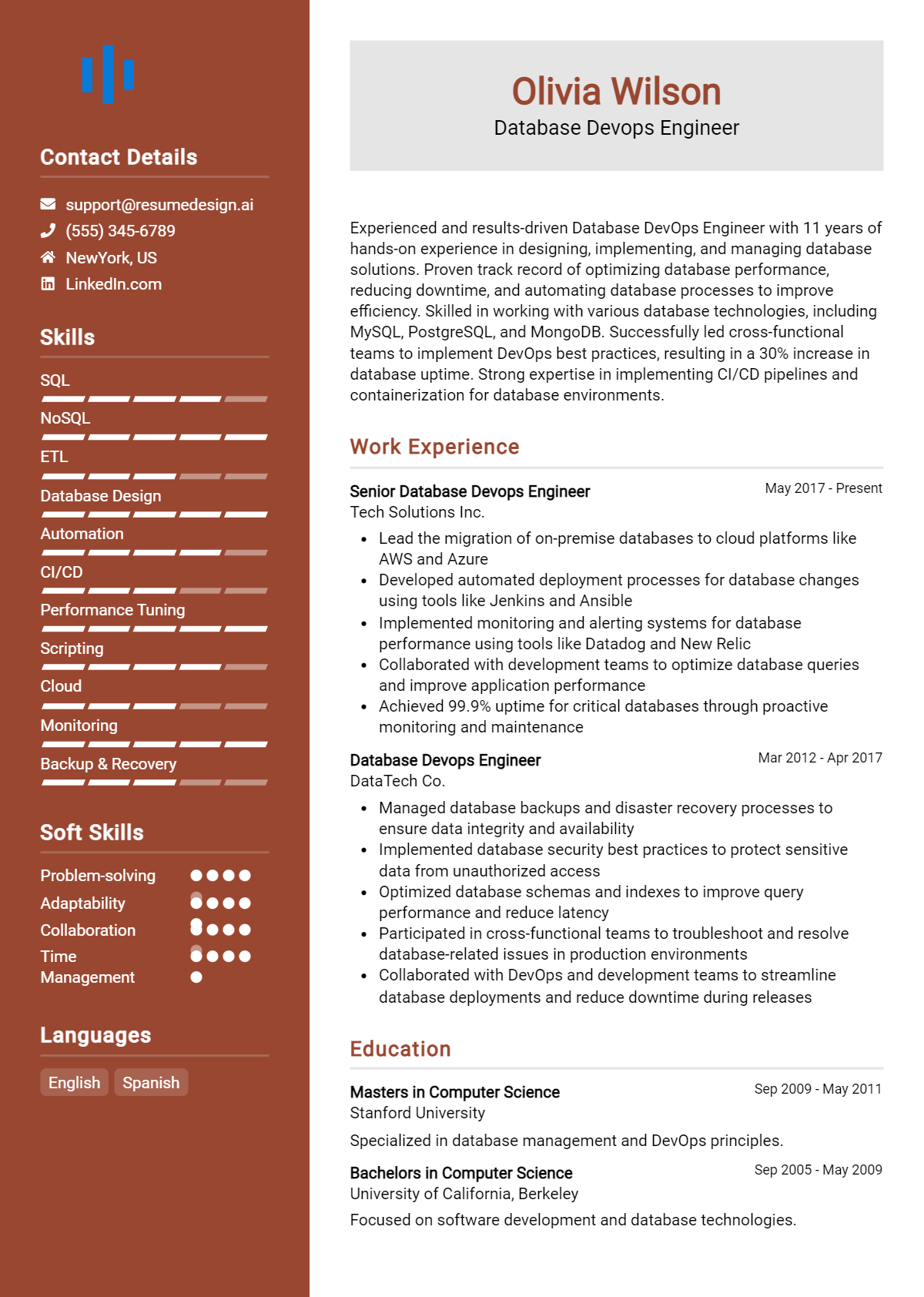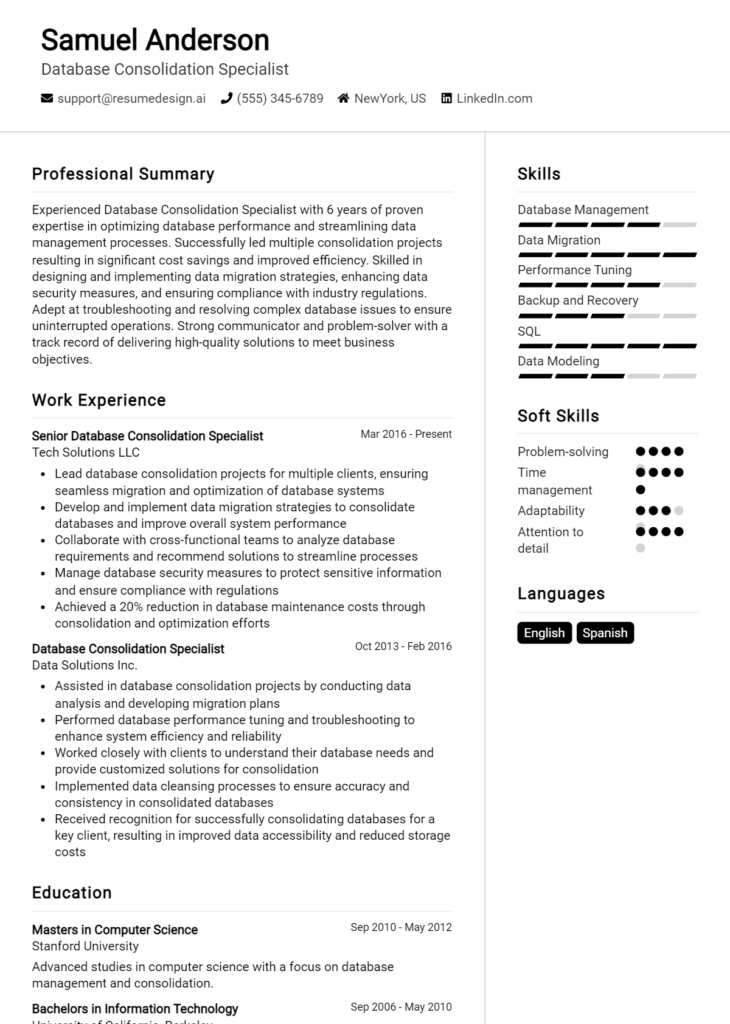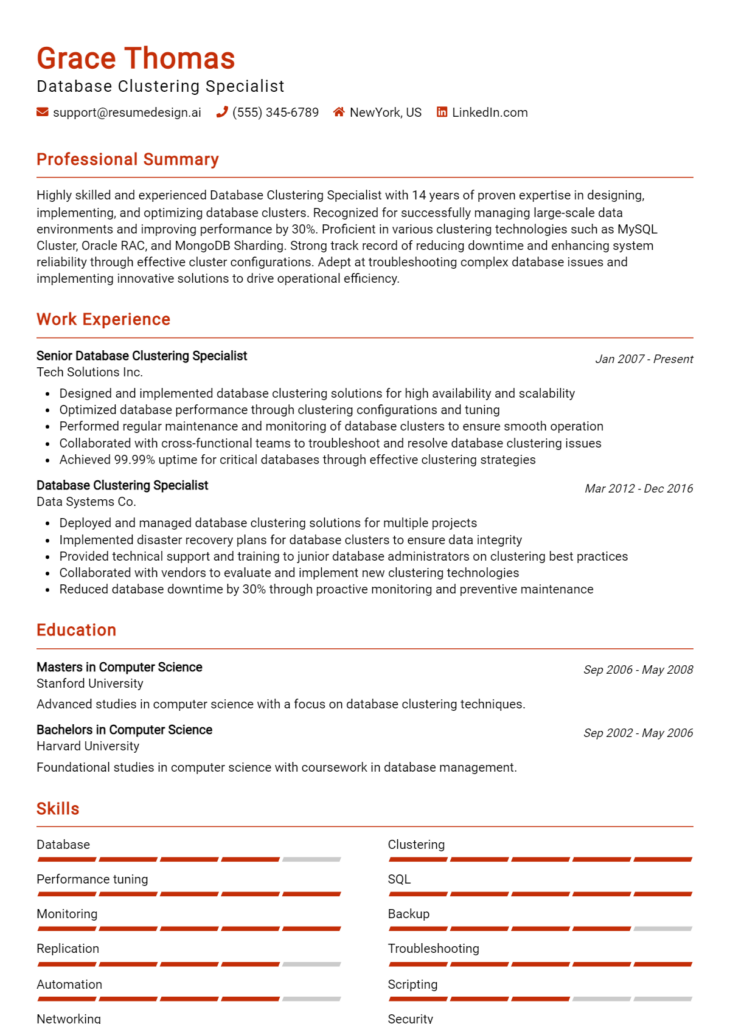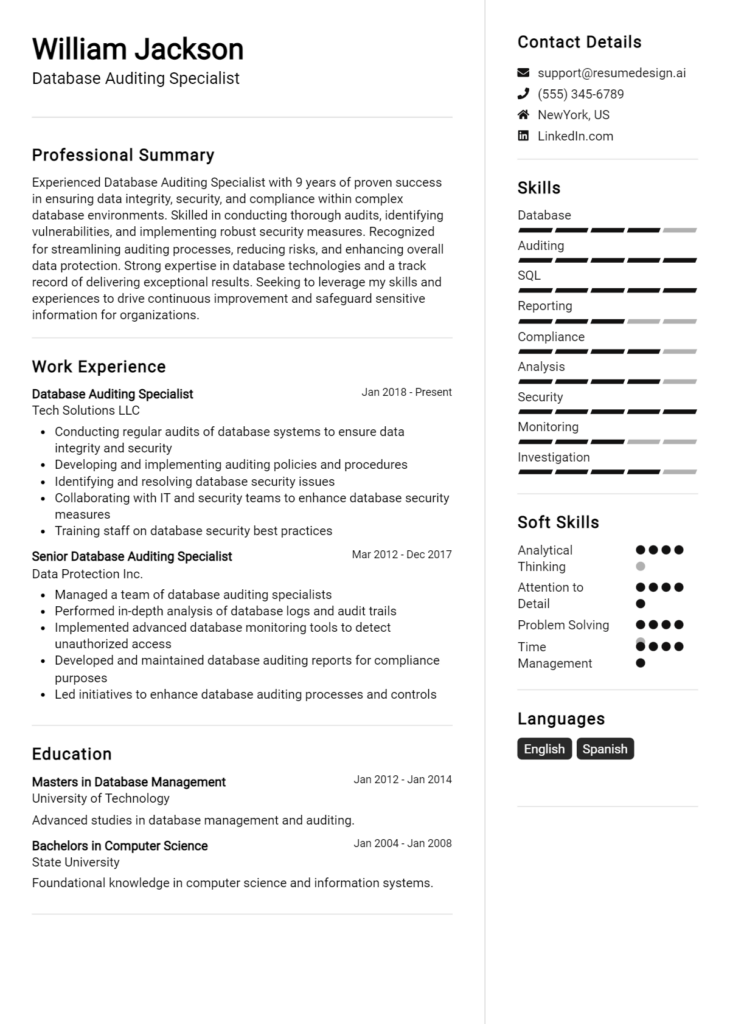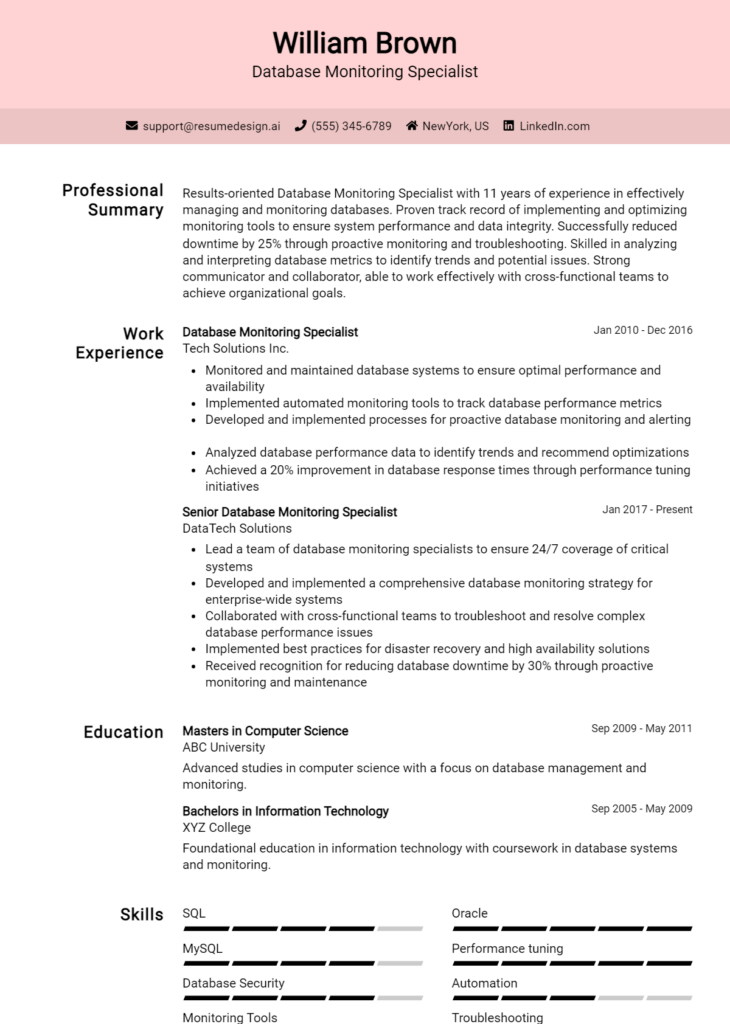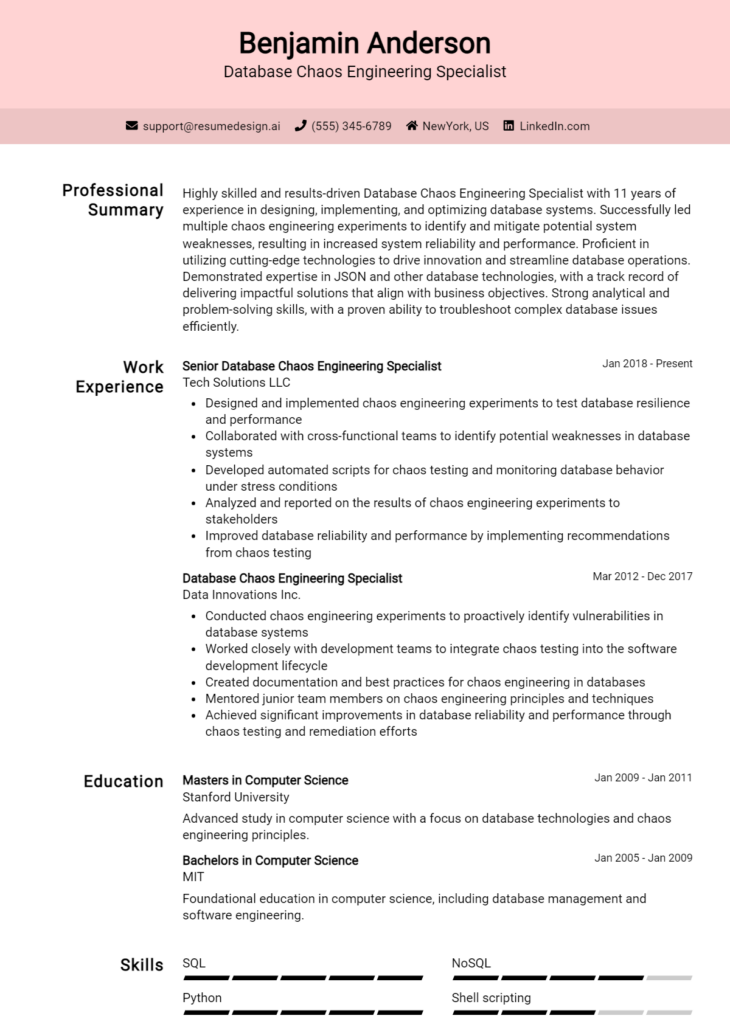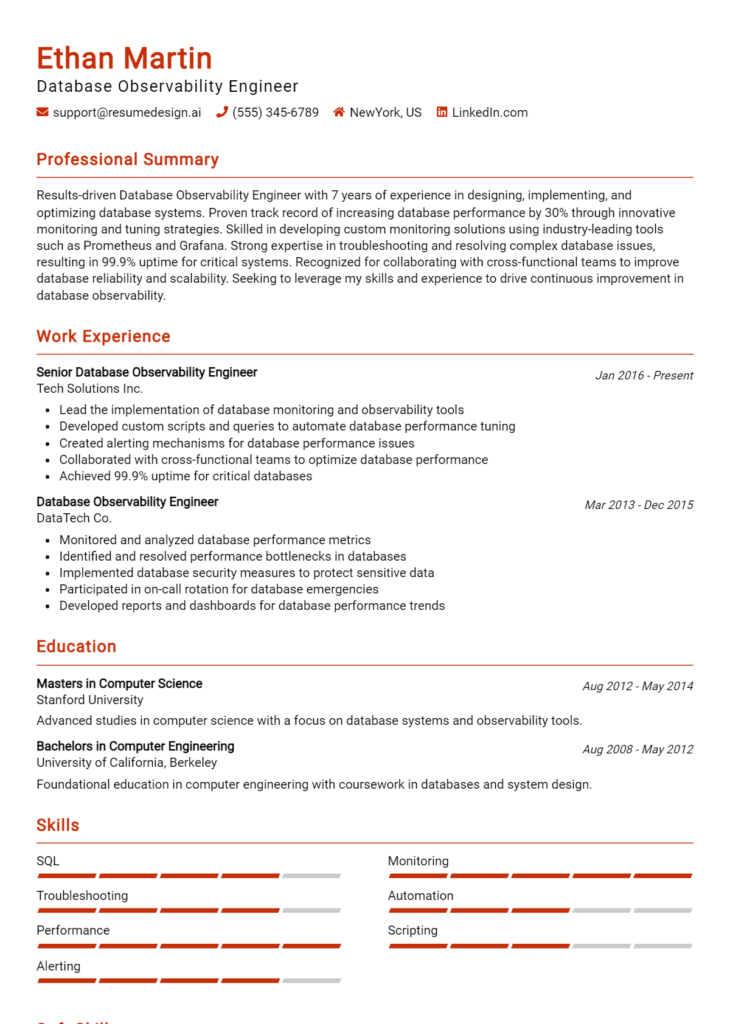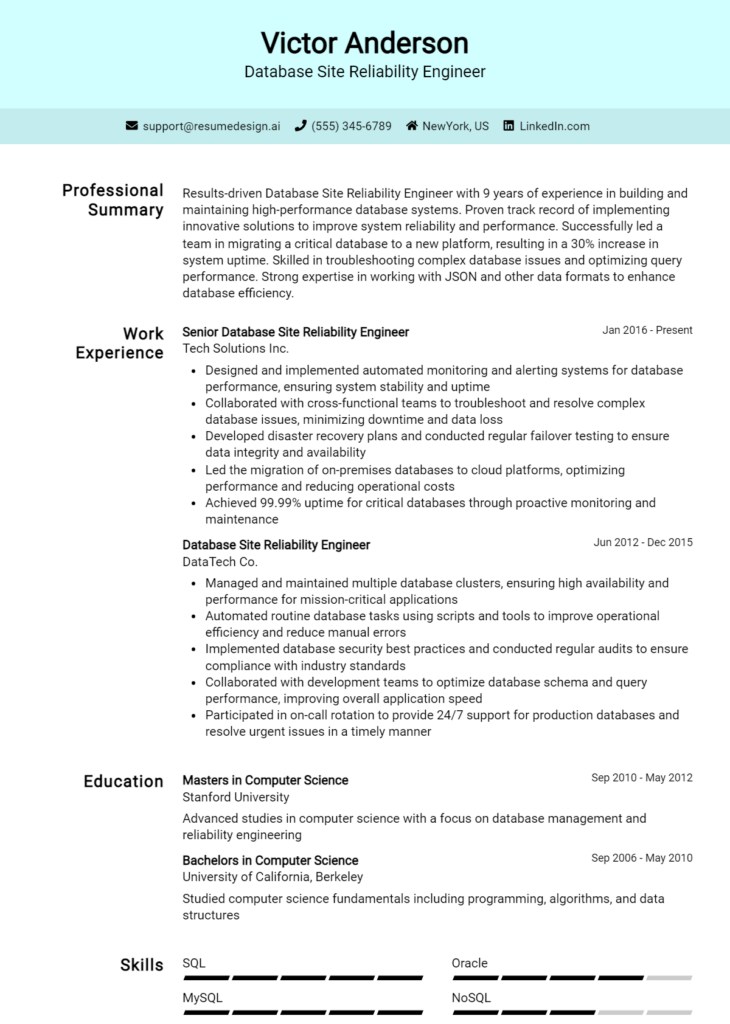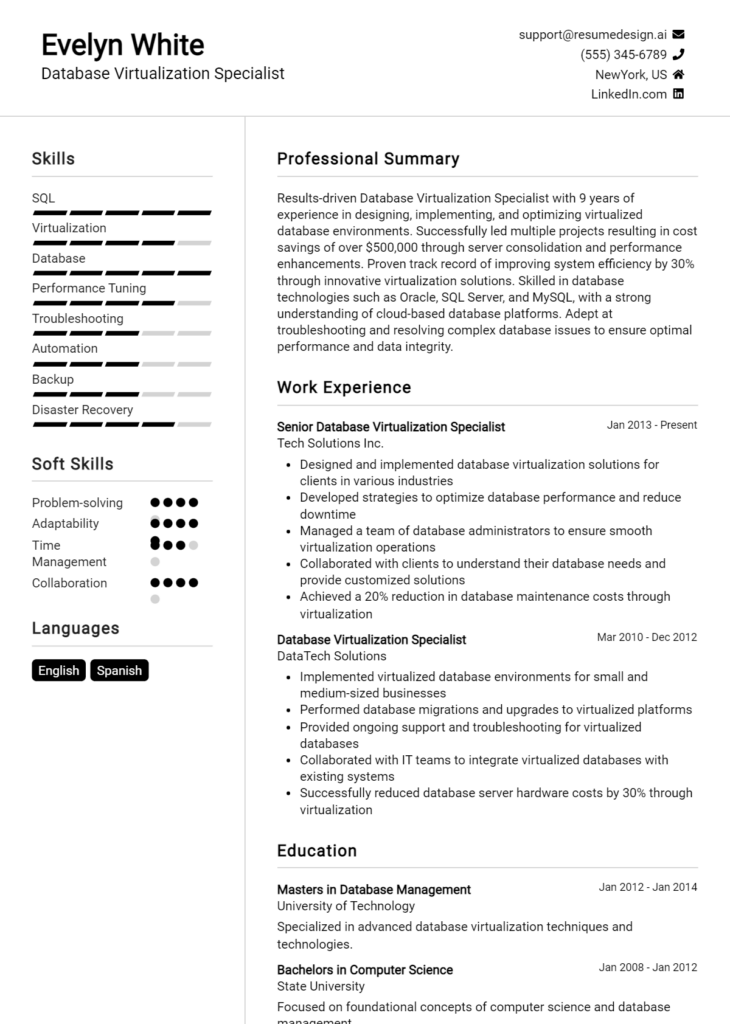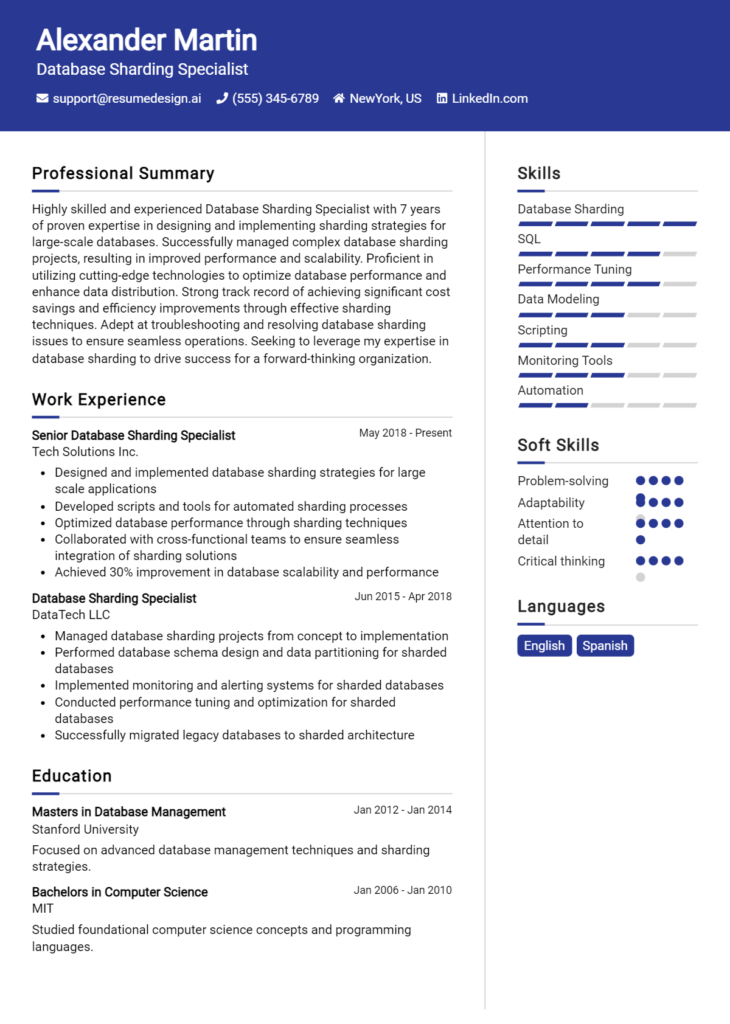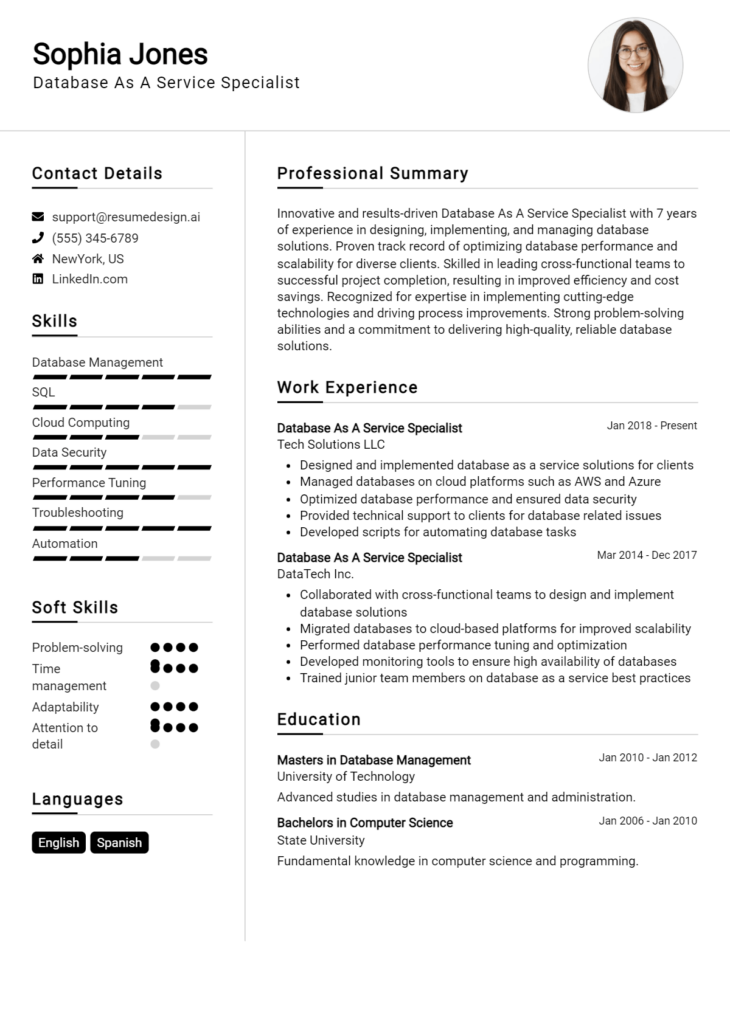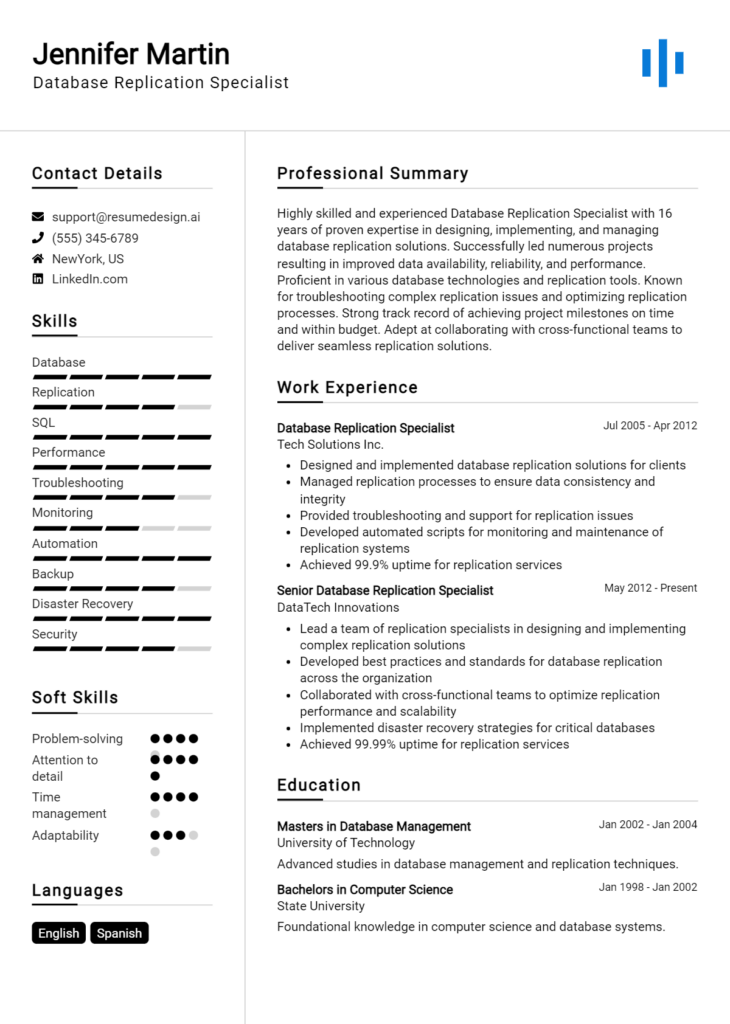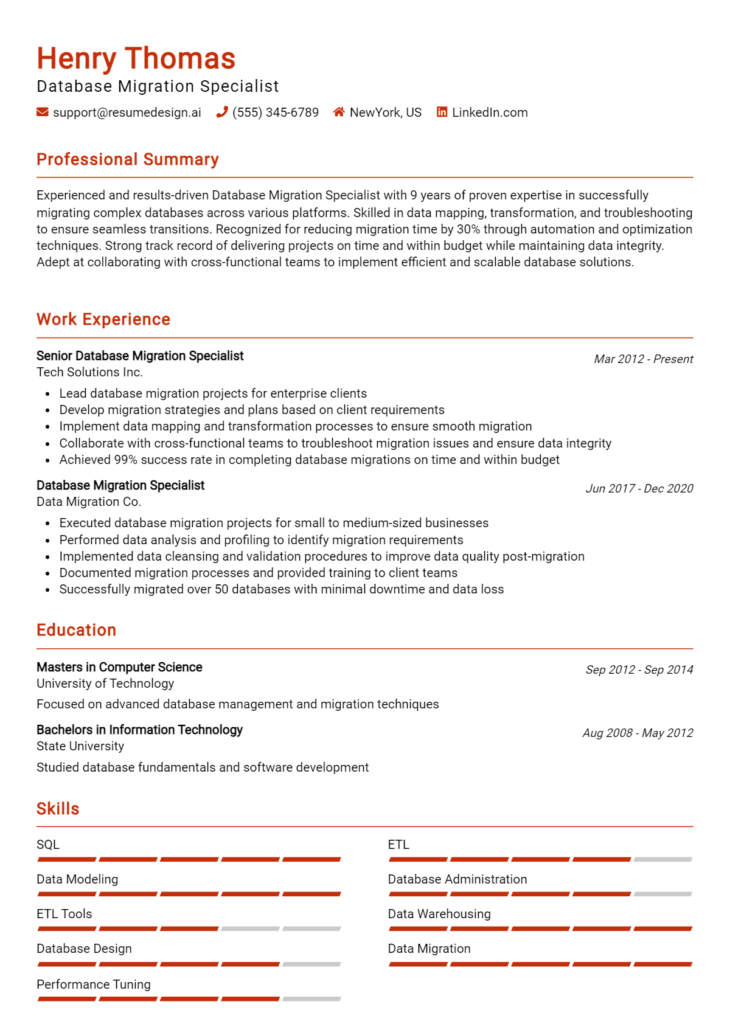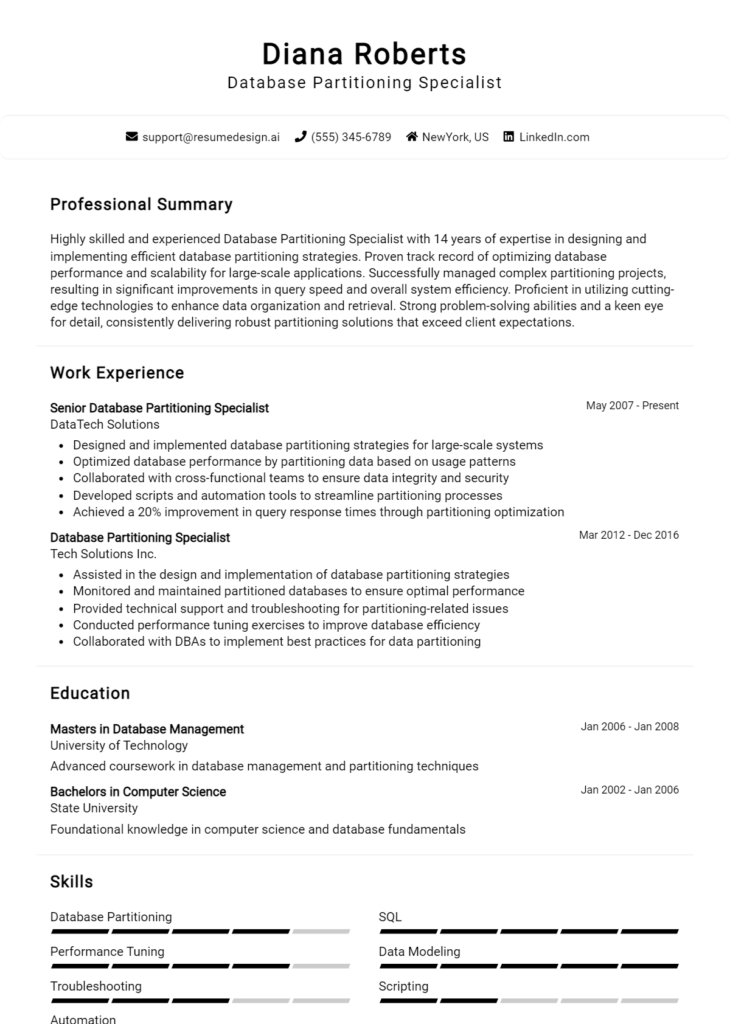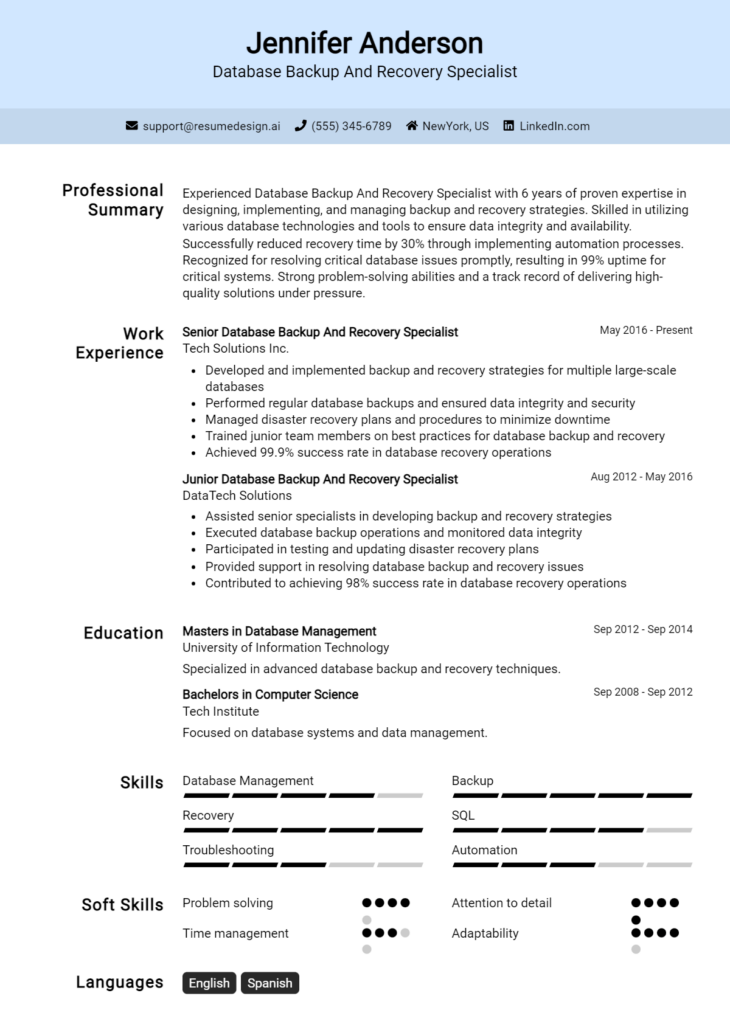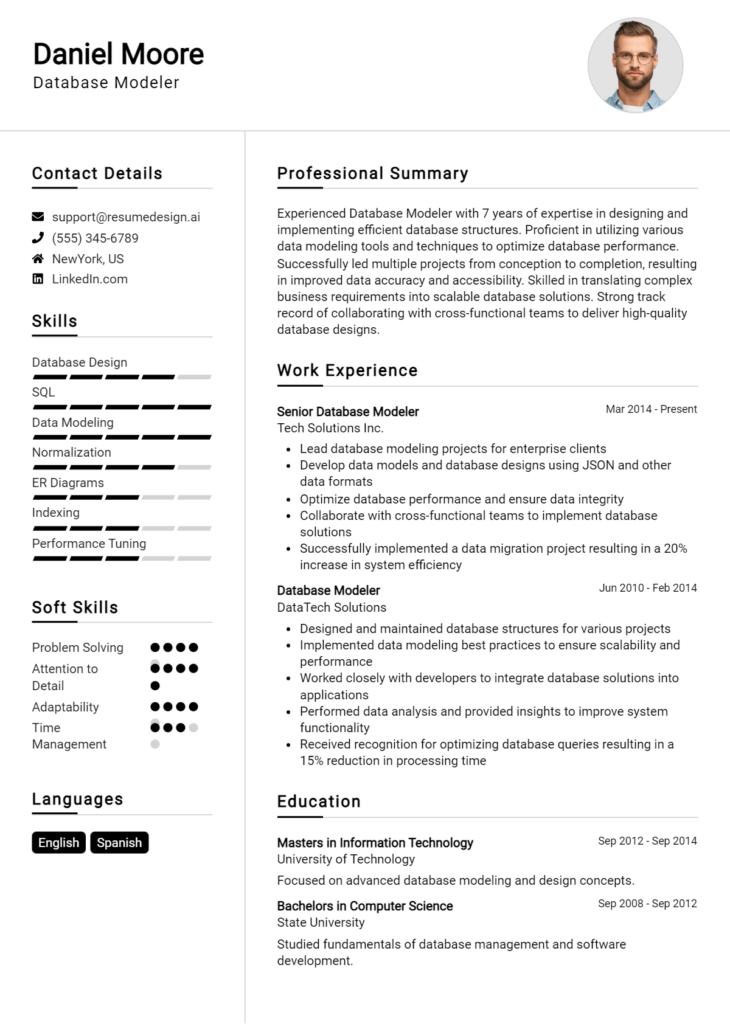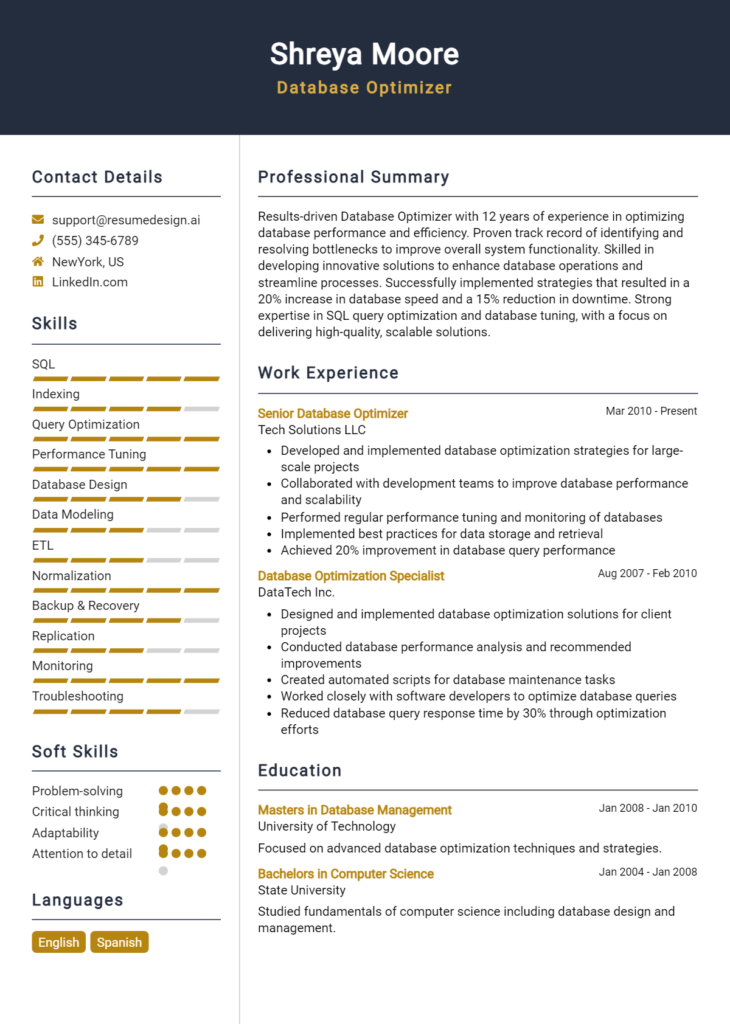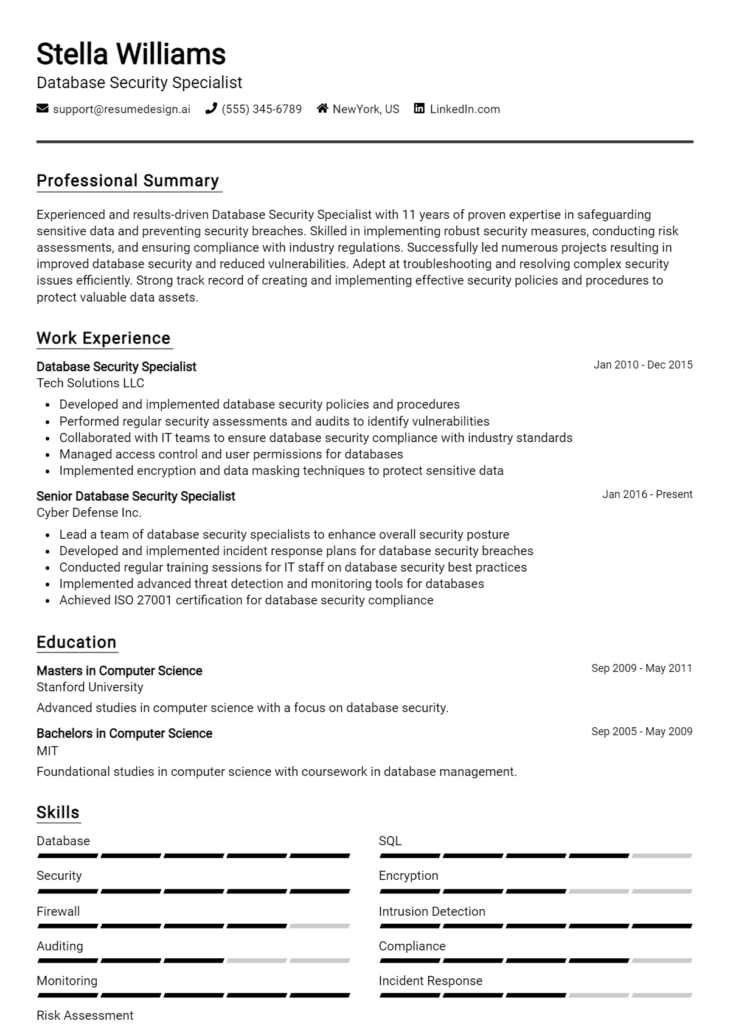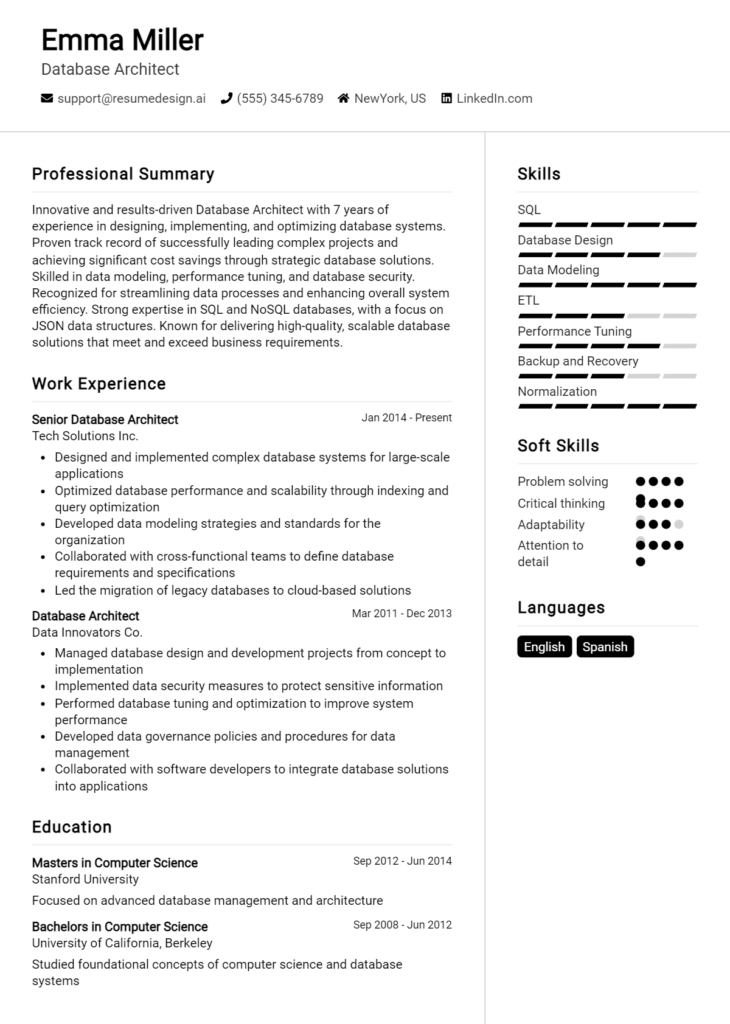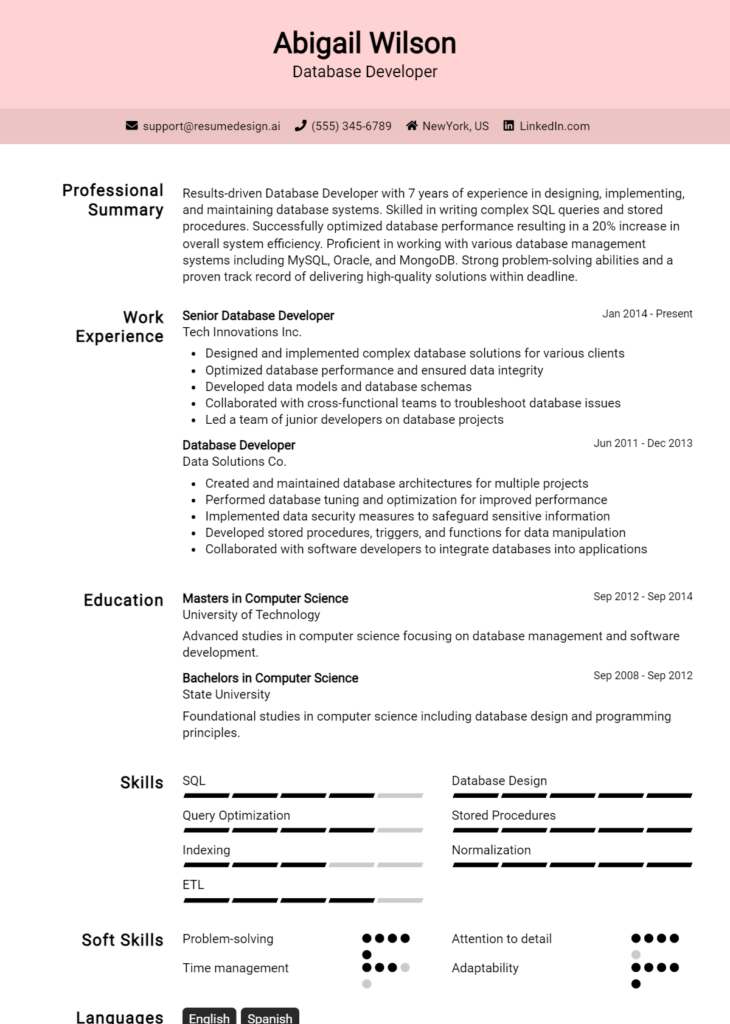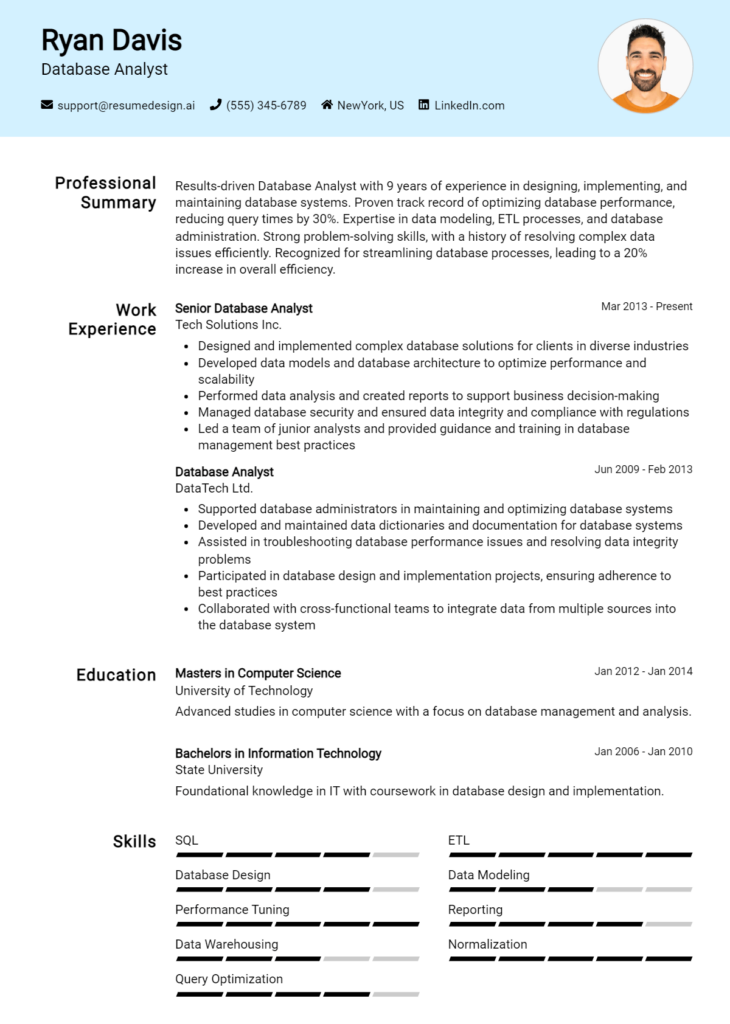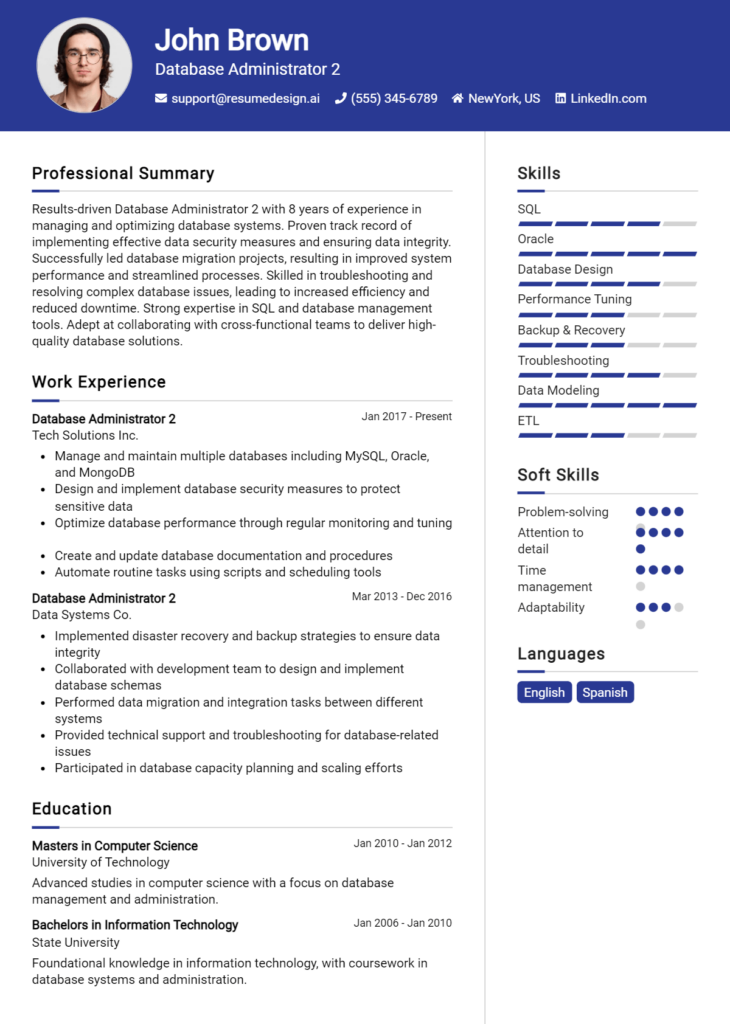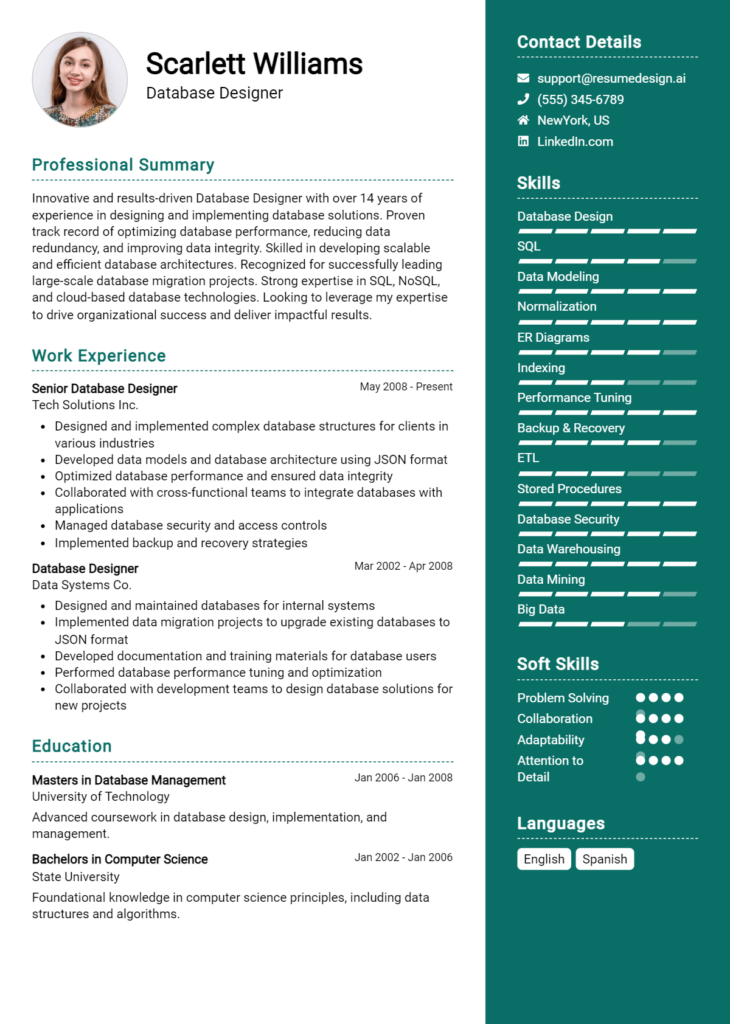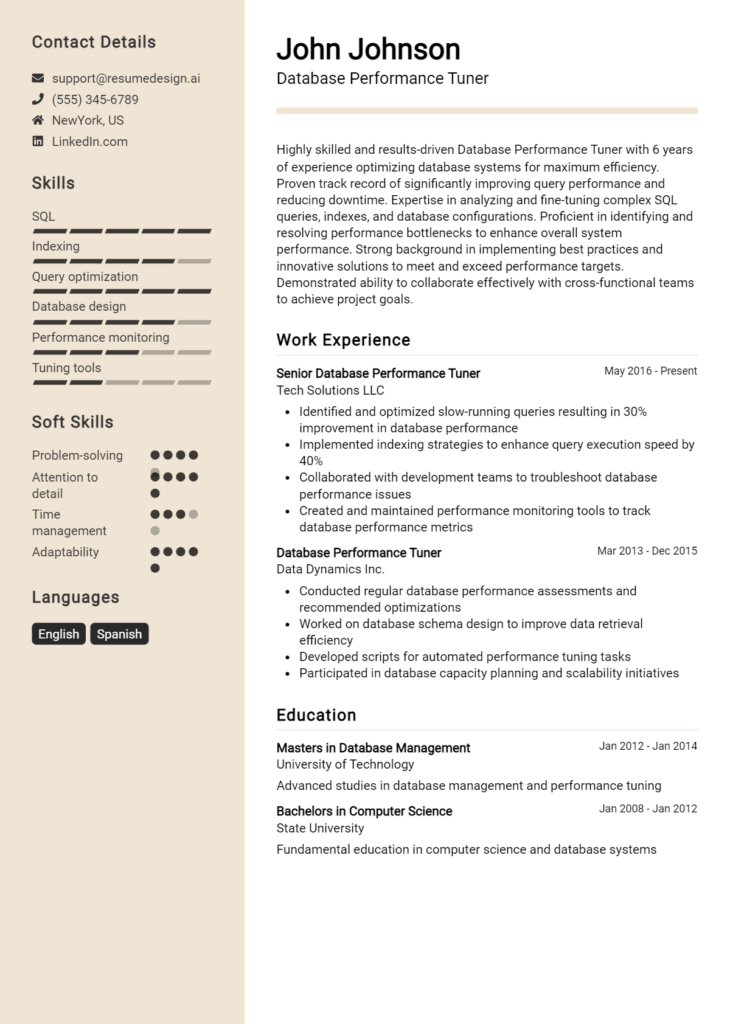Database DevOps Engineer Core Responsibilities
A Database DevOps Engineer plays a crucial role in bridging the gap between database administration and development operations. This professional is responsible for automating database deployment, ensuring data integrity, and optimizing performance across various environments. Key skills include proficiency in database management systems, scripting, and cloud technologies, along with strong problem-solving abilities. These capabilities are vital for achieving organizational goals, as streamlined data processes enhance productivity. A well-structured resume can effectively highlight these qualifications, showcasing the candidate's technical and operational expertise.
Common Responsibilities Listed on Database DevOps Engineer Resume
- Automate database deployment and management processes.
- Monitor database performance and troubleshoot issues.
- Implement backup and recovery strategies.
- Collaborate with development teams to optimize database queries.
- Ensure data security and compliance with regulations.
- Manage database scaling and capacity planning.
- Develop and maintain documentation for database processes.
- Conduct performance tuning and optimization of database systems.
- Integrate database solutions with CI/CD pipelines.
- Provide technical support and training for database users.
- Design and implement database monitoring solutions.
- Participate in architecture and design discussions for database solutions.
High-Level Resume Tips for Database DevOps Engineer Professionals
In the competitive landscape of technology careers, a well-crafted resume is crucial for Database DevOps Engineer professionals. This document serves as the first point of contact between candidates and potential employers, making it essential to create a strong and positive first impression. A resume should not only highlight technical skills and relevant experience but also showcase significant achievements that demonstrate expertise in the field. This guide aims to provide practical and actionable resume tips that are specifically tailored for Database DevOps Engineer professionals, ensuring that your resume stands out in a crowded job market.
Top Resume Tips for Database DevOps Engineer Professionals
- Tailor your resume for each job application by aligning your skills and experiences with the job description.
- Begin with a strong summary statement that encapsulates your experience in database management, DevOps practices, and cloud technologies.
- Highlight relevant experience by including specific projects where you implemented database solutions in a DevOps environment.
- Quantify your achievements by using metrics; for example, mention how you improved database performance by a certain percentage or reduced downtime.
- Showcase industry-specific skills such as proficiency in SQL, NoSQL databases, automation tools (e.g., Ansible, Puppet), and cloud platforms (e.g., AWS, Azure).
- Include certifications relevant to database management and DevOps practices to enhance credibility.
- Utilize action verbs in your job descriptions to convey your contributions more effectively, such as "designed," "implemented," or "optimized."
- Incorporate keywords from the job listing to help your resume get past automated applicant tracking systems.
- Keep your resume concise and focused; ideally, it should be one page for less experienced candidates and no more than two pages for seasoned professionals.
By implementing these tips, Database DevOps Engineer professionals can significantly enhance their resumes, making them more appealing to potential employers. A well-structured and tailored resume not only highlights your qualifications but also demonstrates your understanding of the role, ultimately increasing your chances of landing a job in this dynamic field.
Why Resume Headlines & Titles are Important for Database DevOps Engineer
In the competitive landscape of tech recruitment, a Database DevOps Engineer's resume can often be the deciding factor in landing an interview. A well-crafted resume headline or title serves as a powerful first impression, enabling candidates to summarize their key qualifications in a succinct and impactful manner. This concise statement not only grabs the attention of hiring managers but also provides a snapshot of the candidate's expertise, making it easier for recruiters to quickly identify suitable candidates for the role. A strong resume headline should be directly relevant to the job being applied for, ensuring it resonates with the specific requirements and expectations of the position.
Best Practices for Crafting Resume Headlines for Database DevOps Engineer
- Keep it concise: Aim for a headline that is no longer than 10-12 words.
- Be role-specific: Tailor the headline to reflect the specific Database DevOps Engineer position.
- Highlight key skills: Include core competencies that are relevant to the job.
- Use action-oriented language: Choose powerful verbs that convey your impact.
- Incorporate industry keywords: Use terms that are commonly associated with the role.
- Showcase achievements: If possible, include a notable accomplishment or certification.
- Make it readable: Avoid jargon and ensure clarity to enhance understanding.
- Avoid clichés: Steer clear of overused phrases that dilute your message.
Example Resume Headlines for Database DevOps Engineer
Strong Resume Headlines
"Database DevOps Engineer with 5+ Years in Cloud Migration and Automation"
“Certified DevOps Professional Specializing in Database Optimization and Scalability”
“Innovative Database Engineer Expert in CI/CD and Data Management Solutions”
“Results-Driven Database DevOps Engineer Focused on Performance Enhancement and Reliability”
Weak Resume Headlines
“Database Developer Looking for Opportunities”
“IT Professional with Experience in Databases”
Strong resume headlines are effective because they are specific, relevant, and highlight the candidate's unique strengths and achievements. They capture the hiring manager's attention by providing a clear and compelling narrative of what the candidate offers, making it easy for recruiters to assess compatibility with the role. On the other hand, weak headlines fail to impress due to their vagueness and lack of focus, leaving hiring managers with no clear understanding of the candidate's qualifications or potential contributions to the team. By avoiding generic phrases and emphasizing distinct skills and accomplishments, candidates can make a lasting impression from the very start.
Writing an Exceptional Database DevOps Engineer Resume Summary
A resume summary is a critical component for a Database DevOps Engineer as it serves as a powerful first impression for hiring managers. A well-crafted summary quickly highlights the candidate's key skills, relevant experience, and notable accomplishments, effectively showcasing their fit for the role. In a competitive job market, an impactful summary not only captures attention but also sets the tone for the rest of the resume, demonstrating the candidate's qualifications in a concise yet compelling manner. Tailoring this section to align with the specific job requirements can significantly enhance the chances of securing an interview.
Best Practices for Writing a Database DevOps Engineer Resume Summary
- Quantify Achievements: Use specific metrics to demonstrate your impact, such as percentage improvements or cost savings.
- Focus on Key Skills: Highlight technical skills relevant to Database DevOps, including cloud technologies, database management, and automation tools.
- Tailor to the Job Description: Customize your summary for each application to reflect the specific qualifications and experiences sought by the employer.
- Keep it Concise: Aim for 2-4 sentences that clearly communicate your value without unnecessary fluff.
- Use Action Verbs: Start sentences with strong action verbs to convey a sense of proactivity and accomplishment.
- Showcase Relevant Experience: Emphasize past roles and projects that align with the Database DevOps field to demonstrate your expertise.
- Incorporate Industry Keywords: Use terminology and keywords from the job description to pass through Applicant Tracking Systems (ATS).
- Highlight Soft Skills: Don’t forget to mention relevant soft skills like teamwork, problem-solving, and communication that are crucial in a DevOps environment.
Example Database DevOps Engineer Resume Summaries
Strong Resume Summaries
Results-driven Database DevOps Engineer with over 5 years of experience in optimizing database performance and automating deployment processes. Successfully reduced downtime by 30% through the implementation of CI/CD pipelines and monitoring tools. Proficient in AWS, PostgreSQL, and Docker.
Detail-oriented Database DevOps professional with a proven track record of managing high-availability database systems. Increased data retrieval speeds by 40% by redesigning database architecture and implementing indexing strategies. Skilled in utilizing Terraform and Kubernetes for infrastructure as code.
Innovative Database DevOps Engineer with a focus on cloud migration and database security. Spearheaded a project that migrated 50+ databases to AWS, achieving a 25% cost reduction in infrastructure. Experienced in SQL, NoSQL, and Agile methodologies.
Weak Resume Summaries
Database DevOps Engineer with some experience in databases and cloud technologies. Looking for a new job opportunity.
Enthusiastic IT professional interested in database management and DevOps. Strong team player and eager to learn.
The examples of strong resume summaries are considered effective because they provide specific achievements, quantify results, and directly relate to the skills needed for a Database DevOps Engineer role. They demonstrate the candidate's capabilities and contributions in measurable terms. In contrast, the weak summaries lack detail, are overly generic, and fail to highlight any quantifiable outcomes or relevant experience, making it difficult for hiring managers to assess the candidate's qualifications.
Work Experience Section for Database DevOps Engineer Resume
The work experience section of a Database DevOps Engineer resume is crucial as it provides prospective employers with insight into the candidate's technical skills, leadership abilities, and track record of delivering high-quality products. This section not only showcases the candidate's hands-on experience with database management systems, automation tools, and cloud services, but also highlights their ability to collaborate with cross-functional teams and manage projects effectively. Quantifying achievements, such as improvements in system performance or reductions in deployment times, and aligning the experience with industry standards are essential to demonstrate professionalism and relevance in a competitive job market.
Best Practices for Database DevOps Engineer Work Experience
- Focus on specific technical skills relevant to database management and DevOps practices.
- Quantify achievements with metrics, such as percentage improvements in performance or time savings.
- Highlight collaborative projects that involved cross-functional teams or stakeholders.
- Use action verbs to describe responsibilities and accomplishments clearly.
- Align experience descriptions with industry standards and terminology.
- Showcase leadership roles or initiatives taken to improve processes or systems.
- Include certifications or relevant training that support your technical expertise.
- Tailor your experience to match the specific job description and requirements.
Example Work Experiences for Database DevOps Engineer
Strong Experiences
- Led a cross-functional team to implement a CI/CD pipeline that reduced deployment time by 40%, enhancing overall productivity.
- Managed a cloud migration project that resulted in a 30% decrease in operational costs while improving database performance by 50%.
- Designed and executed automated backup solutions, achieving a 99.9% data availability rate and ensuring compliance with industry regulations.
- Collaborated with development teams to optimize database queries, resulting in a 25% increase in application response time.
Weak Experiences
- Worked on some database-related tasks with no measurable outcomes or impacts described.
- Assisted in team projects without specifying individual contributions or responsibilities.
- Gained experience with database tools but failed to detail specific technologies used or results achieved.
- Participated in meetings regarding DevOps processes, but did not elaborate on actionable insights or outcomes.
The examples provided illustrate strong experiences through clear metrics and demonstrable outcomes, showcasing effective leadership and collaboration. In contrast, the weak experiences lack specificity and quantifiable results, making them less impactful in demonstrating the candidate's abilities and contributions. Strong experiences communicate value and relevance, while weak experiences leave potential employers with unanswered questions about the candidate's qualifications.
Education and Certifications Section for Database DevOps Engineer Resume
The education and certifications section of a Database DevOps Engineer resume is crucial for showcasing a candidate's academic background, industry-relevant certifications, and commitment to continuous learning. This section not only highlights formal education but also emphasizes specialized training and coursework that align with the demands of the role. By presenting relevant qualifications, candidates can significantly enhance their credibility and demonstrate their preparedness for the job, making it easier for potential employers to assess their fit for the position.
Best Practices for Database DevOps Engineer Education and Certifications
- Focus on relevant degrees, such as Computer Science, Information Technology, or Data Engineering.
- Include industry-recognized certifications like AWS Certified Database Specialty or Microsoft Certified: Azure Database Administrator Associate.
- Highlight specialized training in database management systems (DBMS), cloud services, and automation tools.
- Provide details on relevant coursework that demonstrates knowledge in database design, development, and administration.
- Emphasize continuous learning efforts by listing recent workshops, seminars, or online courses in the field.
- Ensure that all listed qualifications are current and relevant to the Database DevOps landscape.
- Consider including GPA or honors if they strengthen the educational background.
- Tailor the education and certifications section to align with the specific job description and company needs.
Example Education and Certifications for Database DevOps Engineer
Strong Examples
- Bachelor of Science in Computer Science, University of Technology, 2020
- AWS Certified Database Specialty, Amazon Web Services, 2023
- Microsoft Certified: Azure Database Administrator Associate, 2022
- Coursework in Database Management Systems, Data Warehousing, and Cloud Computing.
Weak Examples
- Bachelor of Arts in Literature, University of Arts, 2018
- Certification in Basic Microsoft Office Skills, 2019
- Old certification in Oracle Database 10g, 2015
- Coursework in Photography and Creative Writing.
The strong examples are considered relevant as they directly pertain to the skills and knowledge required for a Database DevOps Engineer role, showcasing technical expertise and contemporary industry certifications. In contrast, the weak examples lack relevance to the position; degrees and certifications that do not align with database technologies or DevOps practices do not support the candidate’s qualifications effectively. This distinction is vital for presenting a focused and compelling case to potential employers.
Top Skills & Keywords for Database DevOps Engineer Resume
A well-crafted resume for a Database DevOps Engineer is crucial not only for showcasing technical proficiency but also for highlighting the essential soft skills that contribute to successful collaboration and project execution in a fast-paced environment. As organizations increasingly adopt DevOps practices, the demand for professionals who can seamlessly integrate database management with development and operations has surged. Therefore, it is vital for candidates to present a balanced mix of hard and soft skills in their resumes to stand out in a competitive job market. This combination not only demonstrates technical expertise but also reflects adaptability, problem-solving capabilities, and effective communication, all of which are key to thriving in this role.
Top Hard & Soft Skills for Database DevOps Engineer
Soft Skills
- Problem-solving
- Communication
- Team collaboration
- Adaptability
- Time management
- Critical thinking
- Attention to detail
- Conflict resolution
- Leadership
- Creativity
Hard Skills
- Proficiency in SQL and NoSQL databases
- Database design and architecture
- Performance tuning and optimization
- Familiarity with cloud platforms (AWS, Azure, GCP)
- Scripting languages (Python, Bash, etc.)
- Continuous integration/continuous deployment (CI/CD) practices
- Version control systems (Git)
- Infrastructure as Code (IaC) tools (Terraform, Ansible)
- Monitoring and logging tools
- Backup and recovery strategies
For more insights on how to enhance your resume with the right skills and to effectively showcase your work experience, make sure to tailor your content to align with the expectations of potential employers in the Database DevOps field.
Stand Out with a Winning Database DevOps Engineer Cover Letter
Dear [Hiring Manager's Name],
I am writing to express my interest in the Database DevOps Engineer position at [Company Name] as advertised on [where you found the job listing]. With a strong background in database management, cloud technologies, and continuous integration/continuous deployment (CI/CD) practices, I am excited about the opportunity to contribute to your team and help optimize your database operations while ensuring high availability and performance.
In my previous role at [Previous Company Name], I successfully led a project to migrate our on-premise databases to a cloud-based solution, which resulted in a 30% increase in efficiency and a significant reduction in operational costs. I am proficient in using tools like Terraform and Ansible for infrastructure as code, allowing for streamlined deployments and consistency across environments. My hands-on experience with relational databases such as MySQL and PostgreSQL, along with NoSQL technologies like MongoDB, positions me well to manage diverse database environments effectively.
I am particularly drawn to [Company Name] because of its innovative approach to data management and its commitment to leveraging cutting-edge technologies. I believe my skills in automating database performance monitoring and implementing backup and recovery solutions will be an asset to your team. Furthermore, my collaborative nature and strong communication skills enable me to work seamlessly with cross-functional teams, ensuring that database solutions align with organizational goals and deliver maximum value.
I am eager to bring my expertise in database DevOps to [Company Name] and contribute to your success. Thank you for considering my application. I look forward to the opportunity to discuss how I can support your team and help drive database excellence.
Sincerely,
[Your Name]
[Your LinkedIn Profile or Contact Information]
Common Mistakes to Avoid in a Database DevOps Engineer Resume
When crafting a resume for a Database DevOps Engineer position, it’s crucial to avoid common pitfalls that can undermine your chances of making a great impression. The role demands a unique blend of database management and DevOps practices, and your resume should reflect this specialized skill set. However, many candidates fall into certain traps that dilute their qualifications. Here are some common mistakes to watch out for:
Vague Job Descriptions: Failing to provide specific details about your previous roles and responsibilities can make your experience seem less impressive. Use quantifiable achievements to showcase your impact.
Ignoring Relevant Skills: Omitting critical skills such as automation tools, CI/CD pipelines, or cloud services can be detrimental. Ensure your resume highlights technical competencies relevant to the role.
Overloading with Jargon: While technical terminology is necessary, overusing jargon can confuse hiring managers. Aim for clarity and ensure that even non-technical readers can understand your contributions.
Neglecting Soft Skills: Database DevOps Engineers must collaborate effectively. Not mentioning soft skills like communication, teamwork, and problem-solving can make your resume feel one-dimensional.
Using an Unprofessional Format: A cluttered or overly complex resume layout can detract from your content. Stick to a clean, professional format that emphasizes readability.
Failing to Tailor the Resume: Sending a generic resume to multiple employers can be a critical mistake. Customize your resume for each job application to highlight the most relevant experience and skills.
Not Including Certifications: Certifications related to database management or DevOps (e.g., AWS Certified DevOps Engineer) can set you apart. Ensure these are prominently displayed.
Listing Responsibilities Instead of Achievements: Focusing solely on your duties rather than what you accomplished in your roles can weaken your resume. Emphasize results and how you added value to previous employers.
Conclusion
In this article, we explored the critical role of a Database DevOps Engineer, emphasizing the importance of a strong skill set that encompasses database management, cloud technologies, automation, and collaboration with development teams. We discussed how the integration of DevOps practices enhances efficiency in database operations, ultimately leading to improved application performance and faster deployment cycles.
Additionally, we highlighted the significance of continuous learning and staying updated with the latest industry trends and tools, as well as the need for effective communication skills to bridge the gap between development and operations teams.
As you reflect on the insights shared, now is the perfect time to evaluate your own resume as a Database DevOps Engineer. Ensure that it effectively showcases your technical skills, relevant experience, and accomplishments in the field. To help you craft a standout resume, consider utilizing available resources such as resume templates, a user-friendly resume builder, curated resume examples, and cover letter templates. Take action today to enhance your job application materials and increase your chances of landing your dream role!

